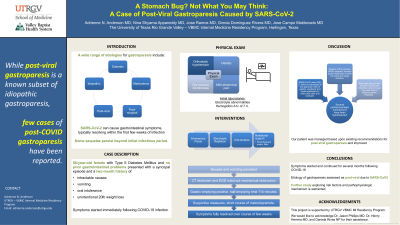Back


Poster Session D - Tuesday Morning
Category: Stomach
D0732 - A Stomach Bug? Not What You May Think: A Case of Post-Viral Gastroparesis Caused by SARS-CoV-2
Tuesday, October 25, 2022
10:00 AM – 12:00 PM ET
Location: Crown Ballroom

Has Audio

Adrienne N. Anderson, MD
University of Texas at Rio Grande Valley
Harlingen, TX
Presenting Author(s)
Adrienne N. Anderson, MD, Nina Appareddy, MD, Jose Ramos, MD, Grecia Dominguez Rivera, MD, Jose Campo Maldonado, MD
University of Texas at Rio Grande Valley, Harlingen, TX
Introduction: Gastroparesis has a wide range of etiologies including diabetes, medications, post-surgical, post-viral and idiopathic. SARS-CoV-2 can cause gastrointestinal symptoms which typically resolve within the first few weeks of infection. However, some sequelae persist beyond the initial infectious period.
Case Description/Methods: A 56-year-old female with Type II Diabetes Mellitus presented with a syncopal episode and a two-month history of intractable nausea, vomiting, oral intolerance, and unintentional 20lbs weight loss following COVID-19 infection. She had no prior gastrointestinal problems. On exam, she had orthostatic hypotension and appeared debilitated with dry mucous membranes. Initial laboratories showed electrolytes abnormalities and a hemoglobin A1c of 7.4.
She was treated with intravenous fluids, electrolyte repletion, and ondansetron, but her nausea and vomiting persisted. CT abdomen and EGD ruled out mechanical obstruction. Gastric emptying was positive with a half-emptying time of 114 minutes. Her symptoms fully resolved over time following a short course of metoclopramide and a brief period of supportive measures.
The patient does have a history of diabetes, a known etiology for gastroparesis. However, her symptoms started and continued for several months following COVID-19 infection, despite adequate glycemic control as evidenced by her hemoglobin A1c. Her gastroparesis was thus attributed to a SARS-CoV-2.
Discussion: Though post-viral gastroparesis is a known subset of idiopathic gastroparesis, few cases of post-COVID gastroparesis have been reported. Most cases represent an exacerbation rather than an index event.
Several pathophysiologic mechanisms have been hypothesized. SARS-CoV-2 uses ACE-2, which is expressed in the glandular cells of gastric, duodenal and rectal epithelium to enter host cells and replicate. Studies of the previous SARS epidemic showed active replication in both the small and large intestine. Post-viral injury to the smooth muscle and interstitial cells of Cajal may also lead to delayed gastric emptying.
Given the lack of available data to guide management specific to post-COVID gastroparesis, our patient was managed based upon existing recommendations for post-viral gastroparesis and improved with this approach.
Disclosures:
Adrienne N. Anderson, MD, Nina Appareddy, MD, Jose Ramos, MD, Grecia Dominguez Rivera, MD, Jose Campo Maldonado, MD. D0732 - A Stomach Bug? Not What You May Think: A Case of Post-Viral Gastroparesis Caused by SARS-CoV-2, ACG 2022 Annual Scientific Meeting Abstracts. Charlotte, NC: American College of Gastroenterology.
University of Texas at Rio Grande Valley, Harlingen, TX
Introduction: Gastroparesis has a wide range of etiologies including diabetes, medications, post-surgical, post-viral and idiopathic. SARS-CoV-2 can cause gastrointestinal symptoms which typically resolve within the first few weeks of infection. However, some sequelae persist beyond the initial infectious period.
Case Description/Methods: A 56-year-old female with Type II Diabetes Mellitus presented with a syncopal episode and a two-month history of intractable nausea, vomiting, oral intolerance, and unintentional 20lbs weight loss following COVID-19 infection. She had no prior gastrointestinal problems. On exam, she had orthostatic hypotension and appeared debilitated with dry mucous membranes. Initial laboratories showed electrolytes abnormalities and a hemoglobin A1c of 7.4.
She was treated with intravenous fluids, electrolyte repletion, and ondansetron, but her nausea and vomiting persisted. CT abdomen and EGD ruled out mechanical obstruction. Gastric emptying was positive with a half-emptying time of 114 minutes. Her symptoms fully resolved over time following a short course of metoclopramide and a brief period of supportive measures.
The patient does have a history of diabetes, a known etiology for gastroparesis. However, her symptoms started and continued for several months following COVID-19 infection, despite adequate glycemic control as evidenced by her hemoglobin A1c. Her gastroparesis was thus attributed to a SARS-CoV-2.
Discussion: Though post-viral gastroparesis is a known subset of idiopathic gastroparesis, few cases of post-COVID gastroparesis have been reported. Most cases represent an exacerbation rather than an index event.
Several pathophysiologic mechanisms have been hypothesized. SARS-CoV-2 uses ACE-2, which is expressed in the glandular cells of gastric, duodenal and rectal epithelium to enter host cells and replicate. Studies of the previous SARS epidemic showed active replication in both the small and large intestine. Post-viral injury to the smooth muscle and interstitial cells of Cajal may also lead to delayed gastric emptying.
Given the lack of available data to guide management specific to post-COVID gastroparesis, our patient was managed based upon existing recommendations for post-viral gastroparesis and improved with this approach.
Disclosures:
Adrienne Anderson indicated no relevant financial relationships.
Nina Appareddy indicated no relevant financial relationships.
Jose Ramos indicated no relevant financial relationships.
Grecia Dominguez Rivera indicated no relevant financial relationships.
Jose Campo Maldonado indicated no relevant financial relationships.
Adrienne N. Anderson, MD, Nina Appareddy, MD, Jose Ramos, MD, Grecia Dominguez Rivera, MD, Jose Campo Maldonado, MD. D0732 - A Stomach Bug? Not What You May Think: A Case of Post-Viral Gastroparesis Caused by SARS-CoV-2, ACG 2022 Annual Scientific Meeting Abstracts. Charlotte, NC: American College of Gastroenterology.

